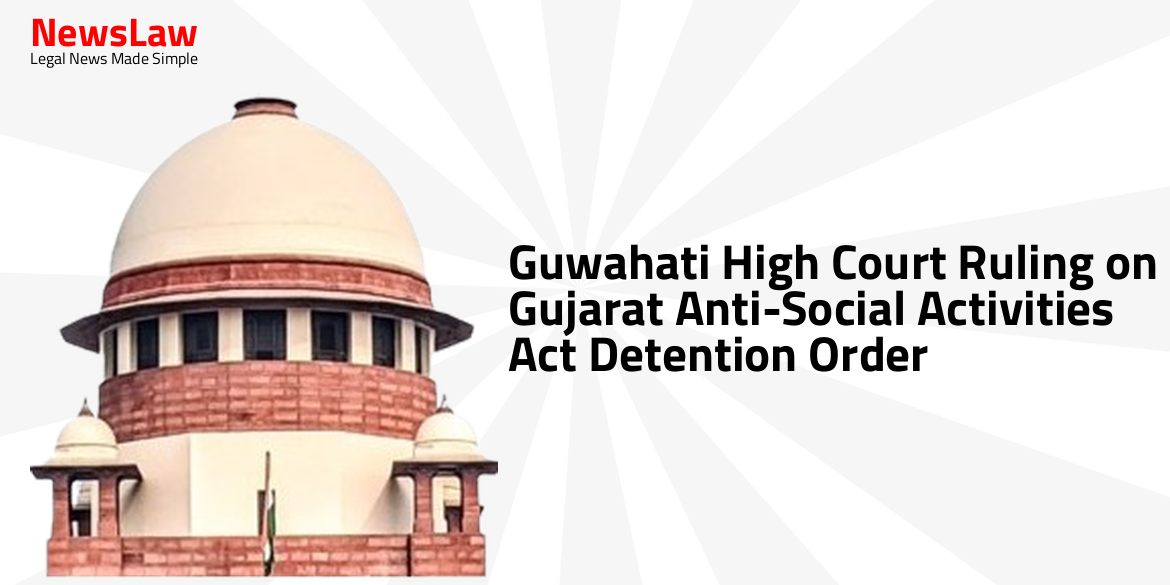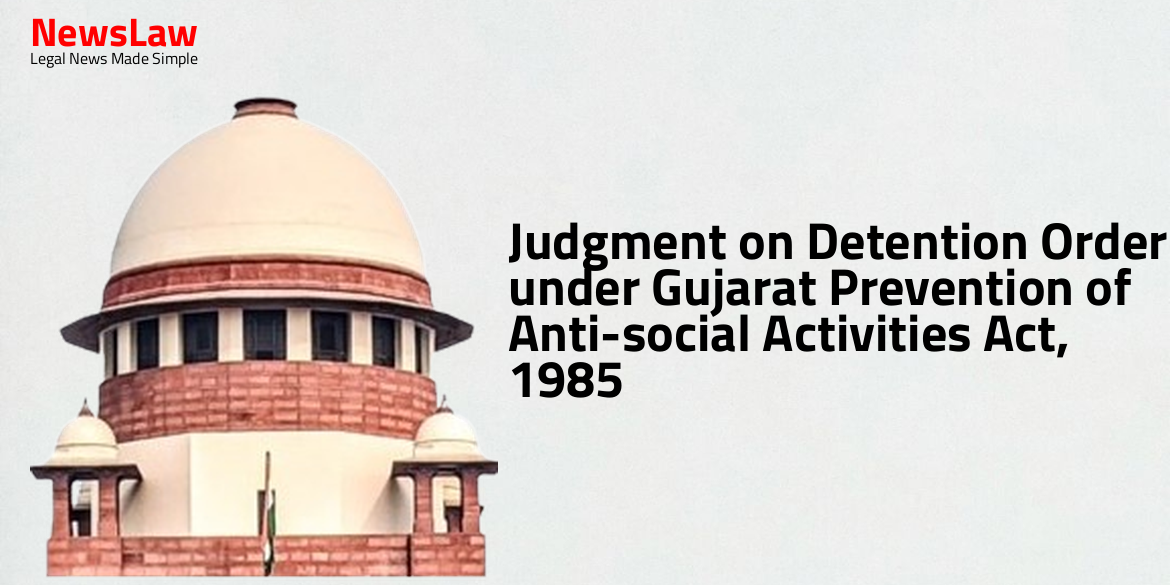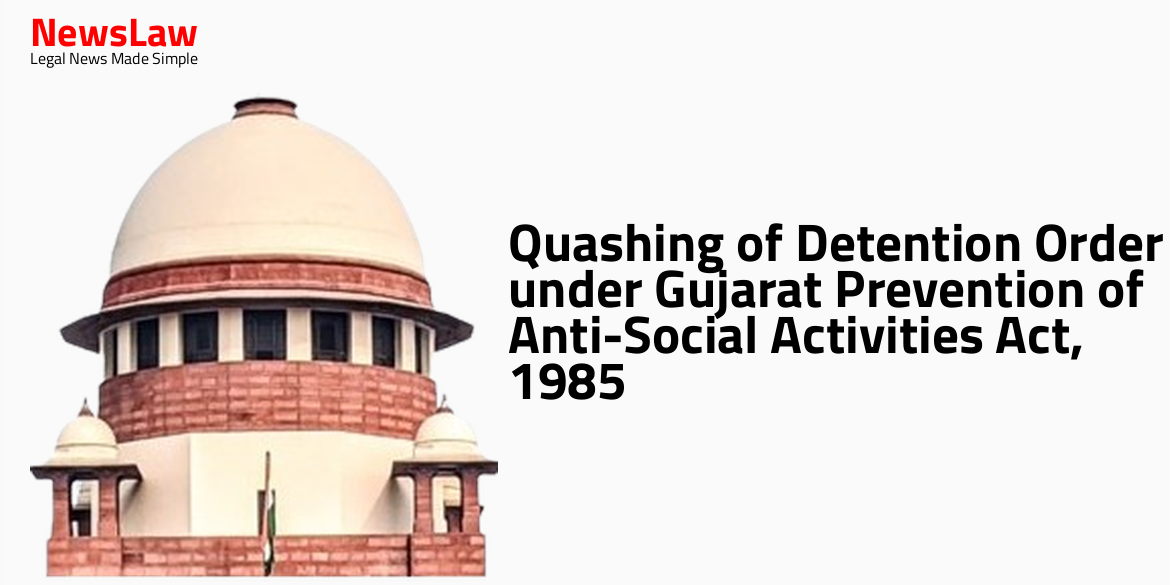Delve into the recent judgment by the Gujarat High Court which examines the issue of public order versus law and order in the case of the Detenue against the State of Gujarat. This case raises critical questions regarding the detenue’s activities and their impact on society as a whole. The court’s decision on the legality and validity of the detenue’s detention order under the Act of 1985 is pending, with significant implications for future preventive detention cases.
Facts
- The court examined the facts of the case in detail.
- The petitioner’s counsel argued that the order was illegal and invalid.
- The court considered the definition of ‘continuation of unlawful activity’ under the Act of 1985.
- The court analyzed the grounds on which the order was based.
- The petitioner challenged the order on various legal and factual grounds.
- The court reviewed the submissions made by both parties.
- The court’s decision on the legality and validity of the order is pending.
Issue
- The main issue to be determined in this case is…
- The parties involved have presented arguments regarding…
- Key points of contention include…
- The decision on this issue will have significant impact on…
- The court will need to carefully examine the relevant laws and precedents in making its determination.
Arguments
- The detenue’s advocate argues that the grounds of detention do not relate to “public order” but are solely a matter of law and order.
- The advocate asserts that the alleged offenses do not affect or have the potential to affect the maintenance of public order as specified under the Act.
- It is claimed that the detenue’s actions only pertain to the maintenance of law and order, not of public order.
- On the other hand, the State Counsel argues that the detenue is a habitual offender whose activities impact society as a whole.
- The State Counsel justifies the detention order based on the detenue’s antecedents and past activities, aiming to prevent him from posing a threat to public order in Ahmedabad.
- The crucial issue is whether the Detaining Authority’s order, issued under the Act of 1985, is legally sustainable.
- The detenue has been imprisoned following the execution of the impugned order.
Analysis
- The incidents mentioned in the grounds of detention do not impact public order.
- The criminal cases against the petitioner do not indicate a threat to public order.
- The alleged anti-social activities of the petitioner do not affect public order.
- The detaining authority failed to show how the petitioner’s actions could harm public order.
- The petitioner being granted bail in all offenses suggests a lack of serious threat to public order.
- The detaining authority wrongly concluded that the petitioner’s activities were prejudicial to public order.
- The offenses committed by the petitioner do not relate to the maintenance of public order.
- The judgment refers to a previous case where detention was invalidated based on prohibition offenses.
- There must be a distinction between serious forms of disorder affecting the community and minor breaches of peace of local significance.
- Every act of assault or injury to specific persons does not necessarily lead to public disorder.
- For an act to be considered as affecting public order, it must impact the community or the public at large.
- Merely contravening any law may affect order, but it does not necessarily constitute affecting public order.
- The case of Pushkar Mukherjee v. State of West Bengal clarified the distinction between ‘law and order’ and ‘public order’.
- Mere disturbance of law and order, resulting in a detention order, is not automatically sufficient for action under preventive detention laws.
- The petitioner cannot be preventively detained under the provisions of the Act unless his activities as a bootlegger affect adversely or are likely to affect adversely the maintenance of public order.
- The petitioner is considered a bootlegger as per the definition in section 2(b) of the Act.
- Being a bootlegger alone is not sufficient reason to detain the petitioner under the Act.
- The material on record does not suggest any feeling of insecurity, panic, or terror among the public in the area in question.
- The alleged activities of the detenue have not adversely affected or are likely to affect the maintenance of public order.
- The subjective satisfaction of the detaining authority is deemed as not legal, valid, or in accordance with the law.
- The offenses alleged against the petitioner and the allegations made by witnesses do not support a case of adversely affecting public order.
Decision
- Detenue to be set at liberty forthwith if not required in any other case
- Rule made absolute accordingly
- Order dated 12.01.2024 passed by the respondent authority quashed
- Direct service permitted
Case Title: BHAVIK @ BHAVESH @ TAGARO @ BHAVLO KANJIBHAI PARMAR THRO KANJIBHAI GANPATBHAI PARMAR Vs. COMMISSIONER OF POLICE
Case Number: R/SCA/2336/2024



